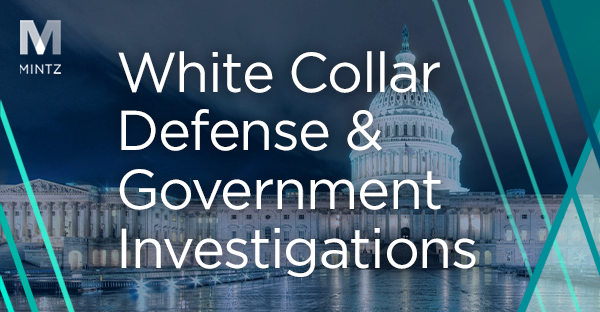
Keshav is a seasoned litigator with a strong focus on the healthcare and life sciences sectors. He represents a wide range of industry stakeholders—including providers, clinical laboratories, health plans, and pharmaceutical manufacturers—in complex civil litigation, government investigations, and regulatory enforcement actions. His practice spans high-stakes matters involving the U.S. Department of Justice (DOJ), state Attorneys General, and the Federal Trade Commission (FTC). Keshav regularly defends clients in cases arising under the False Claims Act (FCA), Anti-Kickback Statute (AKS), consumer protection statutes, and other federal and state healthcare fraud and abuse laws.
Keshav also maintains a broad litigation practice, handling commercial disputes in state and federal courts and before arbitration panels across the life sciences, financial services, and other industries. He also advises private clients in probate-related matters, including will contests, trust disputes, and fiduciary duty claims.
Keshav earned his J.D. from Boston College Law School, where he served as a Summer Associate at Mintz and interned with Greater Boston Legal Services, focusing on eviction defense and public housing issues. He holds a B.S. in Electrical and Computer Engineering from The Ohio State University.
viewpoints
Cybersecurity-Related Enforcement Under the False Claims Act in 2025: New Settlements, Same Lessons — EnforceMintz
January 20, 2026 | Article | By Keshav Ahuja, Samantha Kingsbury
Discover key False Claims Act cybersecurity enforcement trends from 2025, including major DOJ settlements with defense contractors and health care companies. Learn best practices for compliance, self-disclosure, and risk mitigation as enforcement intensifies in 2026.
“False” Sense of Security: DOJ Announces False Claims Act Settlements Related to Failure to Comply with Cybersecurity Requirements
August 4, 2025 | Blog | By Eoin Beirne, Karen Lovitch , Keshav Ahuja
On July 31, 2025, the United States Department of Justice (DOJ) announced a pair of settlements with companies accused of having violated the False Claims Act (FCA) by falsely representing their compliance with certain cybersecurity requirements applicable to federal contractors. These two settlements highlight key aspects of DOJ’s enforcement priorities: (1) DOJ’s strong focus on enforcing the FCA in the cybersecurity space, and (2) DOJ’s willingness to reward companies that self-disclose violations. All government contractors certifying compliance with regulatory and contractual requirements must stay vigilant and take the steps needed to comply.
Dodging Duties: The Ninth Circuit Affirms an Expansive Application of the False Claims Act Consistent with Trump Administration Priorities to Target and Combat Customs Fraud and Tariff Evasion
July 2, 2025 | Blog | By Eoin Beirne, Nick A. LaPalme, Keshav Ahuja
On June 23, 2025, the United States Court of Appeals for the Ninth Circuit affirmed a district court judgment in a case in which the jury found the defendant knowingly made false statements on customs forms to avoid paying duties on Chinese imports. The decision affirms an expansive application of the False Claims Act (“FCA”) that plays directly into the hands of the Trump administration’s evolving enforcement priorities.
Health Care Enforcement Trends & 2025 Outlook
January 17, 2025 | Blog | By Karen Lovitch , Samantha Kingsbury, Keshav Ahuja, Eoin Beirne, Grady Campion, Daniel Cody, Tara E. Dwyer, Laurence Freedman, Hope Foster, Jane Haviland, Nicole Henry, Caitie Hill, Robert Kidwell, Nick A. LaPalme, Scott Lashway, Kevin McGinty, Payton Thornton, Matthew Stein, Rachel Yount
Our 2025 edition of EnforceMintz reflects on health care enforcement trends, predicts how health care enforcement may evolve, and offers practical guidance about what these trends and predictions mean for health care providers, payors, and other stakeholders.
EnforceMintz — Scienter, Causation, and Constitutional Questions: 2024’s Three Key FCA Litigation Issues
January 16, 2025 | Blog | By Keshav Ahuja, Grady Campion, Laurence Freedman, Kevin McGinty
In 2024, federal courts issued significant False Claims Act decisions for the health care and life sciences industries. These decisions further develop the FCA scienter standard addressed by the Supreme Court in its 2023 SuperValu decision and reexamine the constitutionality of the FCA’s qui tam provisions. A circuit split on the interpretation of “causation” for FCA suits based on alleged violations of the Anti-Kickback Statute (AKS) has also emerged.
Challenge to False Claims Act Qui Tam Provisions Fails in an Initial Attempt to Revive Long-Dormant Arguments as to Constitutionality Under Article II
December 7, 2023 | Blog | By Kevin McGinty, Keshav Ahuja
This July, we detailed the Supreme Court’s surprising revival in United States ex rel. Polansky v. Exec. Health Resources, No. 21-1052 (S. Ct. June. 16, 2023), of the question of whether the qui tam provisions of the False Claims Act (“FCA”), see 31 U.S.C. § 3730(b)(1), violate the Executive Branch’s exclusive grant of authority under Article II of the United States Constitution. In Polansky, a lengthy dissent by Justice Thomas questioned whether the False Claims Act qui tam provisions violated the Appointments Clause and Take Care Clause of Article II of the United States Constitution, arguments that had been endorsed by the Department of Justice (“DOJ”) in the 1989, though ultimately repudiated by DOJ just seven years later. A concurrence by Justice Kavanagh, joined by Justice Barrett, stated that “the Court should consider the competing arguments on the Article II issue in an appropriate case.” Shortly after Polansky was decided, a defendant in a declined qui tam case pending in the United States District Court for the Northern District of Alabama accepted Justice Kavanagh’s invitation, and moved to dismiss on Article II grounds. In a decision entered in November, the District Court rejected that challenge.
Blowing the Whistle on the False Claims Act Qui Tam Provisions: Dissent and Concurrence in Polansky Invite Constitutional Challenge to the Predominant Source of FCA Litigation
July 17, 2023 | Blog | By Kevin McGinty, Keshav Ahuja
Do the qui tam provisions of the False Claims Act (FCA), see 31 U.S.C. § 3730(b)(1), violate the Executive Branch’s exclusive grant of authority under Article II of the United States Constitution? This long-dormant question has been revived in a surprising context. In its recent decision in United States ex rel. Polansky v. Exec. Health Resources, No. 21-1052 (S. Ct. June. 16, 2023), the Supreme Court affirmed the government’s authority to intervene to dismiss a whistleblower action, even after initially declining to intervene in the case. Knowledgeable FCA practitioners expected this result. Less expected was Justice Thomas’s dissent, which argued that the case should have been remanded to allow the parties to brief and argue whether Article II forbids allowing private citizens to maintain FCA claims on behalf of the government. A concurrence by Justice Kavanagh (joined by Justice Barrett), while rejecting Justice Thomas’s call for a remand, nonetheless stated that “the Court should consider the competing arguments on the Article II issue in an appropriate case.” With three justices expressing interest in this question—and only four justices being required to grant certiorari—health care enforcement defense attorneys should now consider whether to raise the constitutionality of the FCA’s qui tam provisions when relators move forward to litigate cases that the government declines to pursue.





